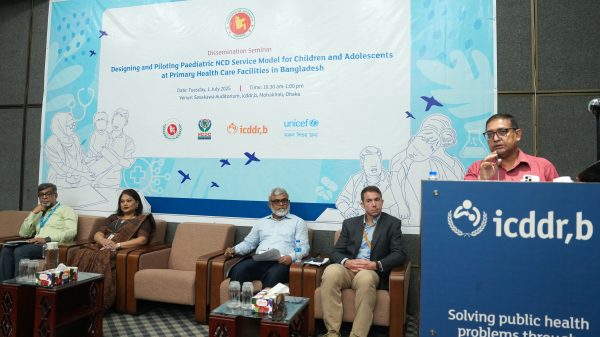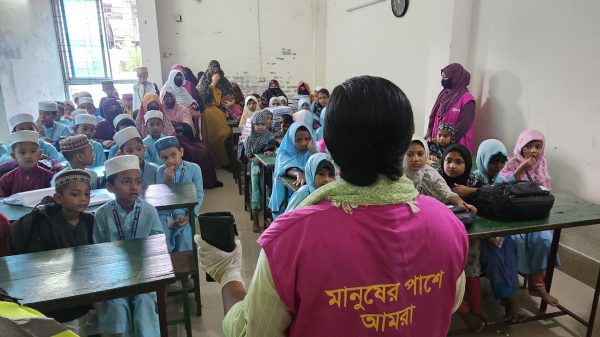The Hidden Costs of Raising Kids Without Grandparental Support

- Update Time : Wednesday, October 30, 2024

In the 90s, Fridays were a sanctuary—a day when Abbu and Ammu could unwind because Nana and Nani would take over, bringing a sense of warmth and comfort only grandparents can. For me, these weren’t just “days off” for my parents; they were deeply meaningful, filled with love and laughter. Nana’s playful teasing or Nani’s endless stories gave my parents some much-needed rest and gifted me a childhood rich in memories. It wasn’t just about the convenience but the profound support system my grandparents provided, emotionally and financially, filling my childhood with a love that felt like it would last forever.
Today, many millennial parents are not as lucky. They face the challenge of raising children without grandparental help—a reality that comes with a significant emotional and financial burden. In Bangladesh, grandparents have traditionally been the silent yet steady backbone of childcare, stepping in and lightening the load, both in terms of costs and the invaluable cultural and emotional connection they offer.
The Challenges Millennial Parents Face

Take my cousin Shabnam, who, like many young parents in Dhaka, works full-time alongside her husband. Without family support, the cost of childcare is nearly overwhelming. Daycare centers are sparse and pricey, often costing between BDT 10,000 to BDT 20,000 per month depending on location and quality. Hiring a nanny? That’s an added expense with its own challenges, like trust and reliability. For Shabnam, paying for daycare means sacrifices—cutting back on essentials like groceries, medical care, or even the occasional family outing. And it’s not just the financial weight but the guilt of spending limited time with her children that makes this reality harder.
The Emotional Impact of Going It Alone
Whenever I was sick, it was Nani who was by my side with her quiet, steady presence, making sure I took my medicine, sharing her endless stories, or just letting me watch Star World with her to keep my spirits up. For Shabnam, a child’s illness means taking a day off work, potentially facing consequences from her employer, and bearing the emotional load without support. This weight of raising children alone is something many young parents are dealing with today.

And it’s not just about convenience—it’s the cultural richness that’s often lost when grandparents aren’t around. Nana taught me patience and the joy of small rituals, like making the perfect cup of cha, a skill I cherish to this day. These small lessons, shared stories, and family traditions shape who we are. For many children today, growing up without nearby grandparents means missing out on these invaluable experiences. The cost of childcare is steep, but the loss of these bonds? Priceless.
Technology: A Small Comfort
For those of us who grew up close to our grandparents, technology is a small comfort. My cousin Shabnam often uses video calls so her daughter can “have breakfast” with Nani, who lives far away in Chattogram. It’s not the same as a real hug or laughter filling the room, but it’s a bridge—a way to keep that connection alive, albeit virtually.

But no amount of video calls can replace a grandparent’s warmth. Technology offers convenience, but it can’t mimic the emotional security that comes with knowing someone who loves your child deeply is there, right by your side.
Finding New Ways to Create Support Networks
With family structures shifting, young parents in Dhaka are forging their own support networks. Shabnam has started a small playgroup with other parents in her apartment complex, taking turns hosting on weekends to give one another a few precious hours of rest. It’s a small but resilient step, reclaiming the village-like community support that previous generations enjoyed so naturally.

These new communities reflect the resourcefulness and determination of today’s young parents, who, despite not having traditional support, are creating their own systems to help one another.
The Need for Broader Solutions
While these individual efforts are crucial, there’s also a need for more structured, systemic support. Affordable childcare options, government incentives for flexible work schedules, and community-based childcare initiatives could transform the lives of parents managing without grandparental help. In Bangladesh, as joint family structures evolve, it’s essential that we rethink how we support young families and ensure they don’t have to go it alone.

The memories of my childhood are filled with the light and laughter of my grandparents’ presence. For today’s children, these experiences are becoming rare, and with them, we lose a bit of the magic that makes childhood special. Raising children without grandparental support isn’t just a financial cost; it’s an emotional and cultural cost, a loss of moments that make life beautiful and memorable.
Ramisa Anjum is a first-year University student









Leave a Reply